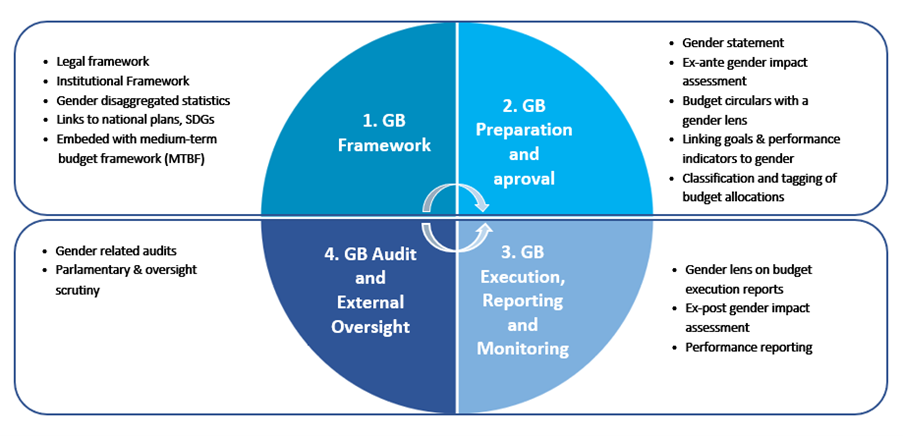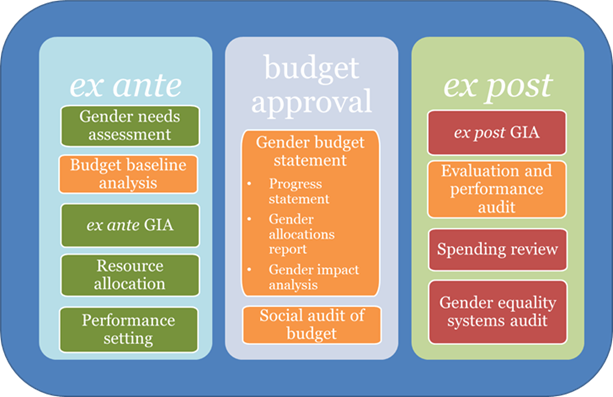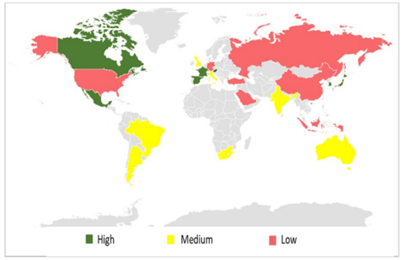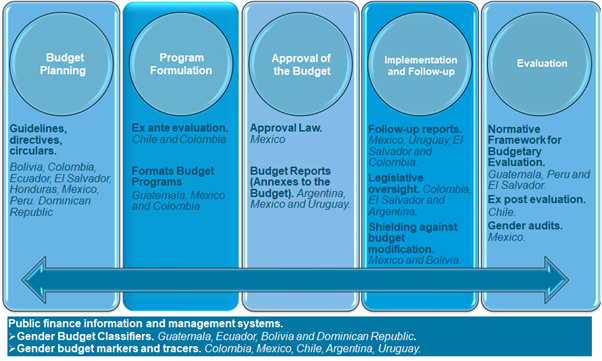While still struggling to recover from the economic impact of the pandemic, countries in Latin America and the Caribbean (LAC) face unprecedented challenges with limited fiscal space. Finding the right expenditure strategy is more important than ever. In this scenario, advancing gender equality offers significant opportunity, with the potential to both address growing gender inequality and boost the region’s GDP by 22%.[1]
Introducing a gender lens into the budgetary process helps understand the impact of the budget and prioritize those policies that make a positive contribution to gender equality. IMF research shows that failing to adopt gender-responsive policies risks long-term scarring effects of the pandemic that will cement women’s disadvantage and harm prospects for recovery.
This was the topic of the event Gender Budgeting: Lessons and Challenges, which was organized by the IDB, IMF, UN Women and OECD that took place in May 2022. During the event we discussed how gender budgeting work, latest trends, and experiences from three countries: Austria; Argentina; and Paraguay.
In this blog we provide a summary of the key takeaways of the event.
What is Gender Budgeting and How Does it Work?
Gender budgeting is the integration of a gender perspective into fiscal policies and the processes of public financial management (PFM). Budgets and policies are never neutral, and gender budgeting removes systemic biases, helping governments be smarter in the design and implementation of policies that could have an unintended negative impact on a segment of the population.
Gender budgeting helps governments to:
- Leverage tax and expenditure policies that address gender imbalances and account for the different impacts on men and women. Notable initiatives include removing gender bias in the tax treatment of part-time workers, and developing comprehensive health care programs for women’s diseases, such as in Brazil. To ensure such initiatives bear fruit, the Organization for Economic Cooperation and Development (OECD) notes the importance of assessing gender equality needs to in uncover the intended and unintended impacts of existing policies and remaining gender gaps. Ex-ante gender impact assessments can help identify how new tax or spending initiatives impact gender equality objectives.
- Mainstream a gender perspective throughout the budget cycle to help promote gender equality. This means integrating a gender perspective at each phase of the budget cycle (budget preparation, execution, monitoring, and external control), underpinned by a gender-sensitive legal and institutional framework and reinforced by parliamentary oversight and scrutiny. Entry points include performance frameworks, impact assessments, tagging[2], spending reviews. Some countries with more advanced gender budgeting practices, such as Mexico, Canada, Austria, and Spain, use multiple approaches.
Figure 1. A gender-responsive budget cycle

- Increase transparency and accountability through greater oversight by parliament and civil society.UN Women notes that accountability is vital to promote gender-responsive policies given the minimal gender-related expenditure – less than one percent – as a proportion of the annual budget in most countries. Members of Argentina’s parliament have been trained to assess the budget’s gender perspective. And in Canada, impact assessments are published, allowing scrutiny by parliament and the public. The Austrian Parliamentary Budget Office (PBO) [3]
- provides parliament with an analysis of gender objectives relating to each budget chapter, improving awareness, and stimulating active debate.
Figure 2. Most common gender budgeting tools

Why is Gender Budgeting Important?
As pointed out in the beginning of this article, reducing the gender gap can have important impacts on economic growth.
Moreover, the recent economic crises and the COVID-19 pandemic have had a disproportionate impact on women and increased inequality. Women are overrepresented in informal, social sector jobs and micro, small and medium enterprises most affected by the pandemic. Furthermore, women tend to do more unpaid work at home than men and are more likely to have taken on increased care responsibilities during the pandemic.
But we must also look beyond the numbers. Reducing the gap is also important for reducing inequality and promoting societies that are more just. For example, gender gaps persist not only in the labour force participation but also in health, education, unpaid care work, access to credit, technology or income, among others.
Gender budgeting can be a valuable tool to help tackle these challenges because it allows governments to better allocate and implement resources in a way that is more inclusive.
That is the reason why gender budgeting can contribute to the achievement of the Sustainable Development Agenda 2030. The UN has set a specific indicator to measure the number of countries with systems to track and make public allocations for gender equality and women’s empowerment.
Gender Budgeting and the Sustainable Development Agenda
The indicator 5.c.1 of the Sustainable Development Goals (SDGs) measures government efforts to track budget allocations for gender equality through the public financial management cycle and to make these allocations publicly available.
It was agreed by the United Nations Statistical Commission to monitor progress toward Target 5c, which calls on Member States to “adopt and strengthen sound policies and enforceable legislation for the promotion of gender equality and the empowerment of all women and girls at all levels.” It is an indicator that describes the characteristics of the fiscal system and does not measure the quantity or quality of resource allocations for gender equality and women’s empowerment.
It addresses three criteria:
- Integration of gender equality objectives/measures in government programs and their respective budget allocations.
- Integration of gender budgeting in public financial management systems and
- Budget allocations for gender equality are publicly available (transparency).
It is the only indicator in the SDG monitoring framework that links national budgeting systems with implementation of legislation and policies for gender equality and women’s empowerment. UN Women in collaboration with OECD and UNDP are the organizations responsible for its global monitoring.
IMF Gender Budgeting Index (GBI)
To monitor a country’s performance in using the budget process to help address the gender gaps, the IMF developed a Gender Budgeting Index (GBI).[4]
Based on survey data, the GBI ranks countries according to the gender budgeting efforts in their country. The study for G-20 economies show that governments perform relatively better in the institutional framework and during budget preparation via the budget circular and gender budget statements – compared to the use of gender impact assessments, budget execution reporting and audit.
Mexico is one of the countries that stands out among G20 countries, with advanced or good practice at each stage of the budget cycle although ex-ante impact assessment also has limited practice.
Figure 3. IMF Gender Budgeting Index (GBI) by country, (G20)

Key Gender Budgeting Initiatives in Latin America and the Caribbean
Latin America stands out for being relatively advanced in performance-based budgeting and the use of gender markers but behind in gender budget statements.
Many countries in the region have institutionalized different elements of gender budgeting to help address gender inequality. Given the region’s diversity, these initiatives vary, ranging from comprehensive gender budgeting systems by pioneers (Mexico) to other more recent initiatives (Argentina, Colombia, Dominican Republic).
The region excels in institutional frameworks, budgeting for results, and gender markers. In general, the use of performance budgeting indicators is more widespread in the region, and future improvements include linking budgets with gender outcomes to assess the impact of these reforms. Like countries in other regions of the world, there is room for progress in LAC in budget statements and execution reports, ex-ante and ex-post evaluation and gender audits. Even though ex-ante gender impact assessments are considered crucial to identify the intended and unintended gender impacts of policy and budget proposals, such assessments are not yet common practice. This is an area that ministries of finance should work on since they will be able to make better budget decisions if their impact assessments include gender-disaggregated data, explicit institutional anchoring, a sound methodological framework and capacity development.
Figure 4. Implementation of gender budgeting in Latin America

A Gender Budgeting Roadmap for the Region
Countries in the region need to take gender budgeting to the next level to be able to accelerate their development with greater equality. However, there is no one-size-fits-all approach. Governments need to mainstream gender budgeting into fiscal policies and PFM processes,[5] with appropriate sequencing. High-level institutional buy-in and ongoing political commitment are also especially important.
The ministries of economy and finance have a leading role but will not be successful on their own. Besides improving technical capacity in line ministries, they also need the technical guidance of women’s ministries and planning ministries as well as collaborate with parliament, and civil society.
The event discussed four significant steps to advance gender budgeting:
- Set up an overarching strategy: Gender budgeting practices need to be guided by a strategy that sets out gender goals. Countries must know what they are trying to achieve with measurable goals.
- Coordination and collaboration are key: Strong links between planning and budgeting are fundamental to good PFM and the implementation of gender-sensitive fiscal policies.
- Improve data quality and availability and analyze the impact: Through gender budgeting tools, governments can identify gender gaps and analyse the impact of expenditure on men and women. By doing so, they make better budget choices. Good availability of disaggregated data for gender indicators is necessary to conduct impact assessments and monitor progress. [6]
- Be strategic on your budgeting approach: Countries need a comprehensive overarching approach to priority budgeting – gender budgeting, green budgeting, well-being budgeting, SDG budgeting, etc.
You can watch the digital recording of the event to learn more about current practices and challenges.
Useful links
Discover more about Gender responsive fiscal policy at the IDB.
Learn more about Gender and the IMF
Visit OECD Gender Budgeting
Further reading:
- UN Women, 2021 COVID-19 and fiscal policy. Applying gender-responsive budgeting in support and recovery measures https://www.unwomen.org/en/digital-library/publications/2021/03/policy-brief-covid-19-and-fiscal-policy#view
- UN Women, 2021, Women and girls left behind: Glaring gaps in pandemic responses
- IMF, Gender Budgeting in G-20 Countries.
[1]. This figure refers to GDP gains from closing the gender gap in Female Labor Force Participation (FLFP). Economic Gains from Gender Inclusion: New Mechanisms, New Evidence. IMF 2018.
[2] Argentina’s country presentation discusses their achievements with ‘tagging.’
[3] One of the event speakers in session two
[4] The GBI follows a similar approach to that of the OECD, World Bank, and PEFA Secretariat.
[5] The Austrian country example noted the importance of gender budgeting as part of wider budget reform.
[6] The presentation on Paraguay discusses the importance of a good data collection system.


Leave a Reply